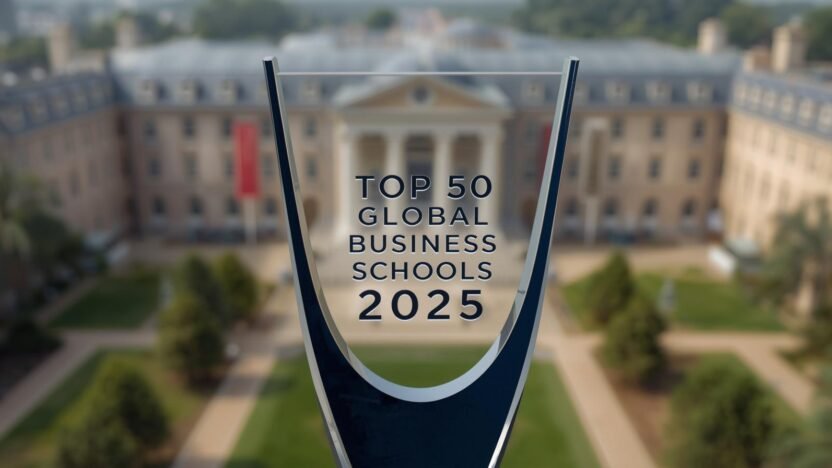Choosing the right business school can transform your career trajectory and open doors to executive leadership positions across the globe. With hundreds of MBA programs worldwide, identifying the top institutions requires careful analysis of academic excellence, career outcomes, and global reputation.
Our comprehensive analysis of the top 50 global business schools for 2025 combines data from multiple authoritative sources, including QS Global MBA Rankings, CEOWORLD magazine, and Times Higher Education rankings. This guide provides prospective students with essential insights to make informed decisions about their business education investment.
Executive Summary: 2025 Global Business School Landscape
The 2025 rankings reveal several key trends in global business education:
- US Dominance Continues: American business schools maintain their leadership position, occupying the majority of top-tier spots.
- European Excellence: European institutions, particularly in the UK and France, demonstrate strong performance in global rankings.
- Asian Growth: Singapore, India, and other Asian markets show increasing prominence in business education
- Specialization Focus: Schools are differentiating through specialized programs in technology, sustainability, and entrepreneurship
Methodology and Ranking Criteria
The 2025 rankings are based on a comprehensive evaluation across multiple dimensions:
Primary Assessment Factors:
- Academic Reputation (25%)
- Employer Reputation (30%)
- Alumni Outcomes (20%)
- Faculty-Student Ratio (10%)
- International Faculty Diversity (5%)
- International Student Diversity (5%)
- Research Impact (5%)
The Top 50 Global Business Schools 2025
Top 10 Elite Business Schools
1. Stanford Graduate School of Business (USA)
- Location: Stanford, California
- Notable Programs: MBA, MSx, PhD
- Key Strengths: Entrepreneurship, Innovation, Technology Leadership
- Average Starting Salary: $180,000+
2. University of Pennsylvania – Wharton School (USA)
- Location: Philadelphia, Pennsylvania
- Notable Programs: MBA, Executive MBA, PhD
- Key Strengths: Finance, Consulting, Global Business
- Average Starting Salary: $175,000+
3. Harvard Business School (USA)
- Location: Boston, Massachusetts
- Notable Programs: MBA, Executive Education, Doctoral Programs
- Key Strengths: General Management, Leadership, Case Method
- Average Starting Salary: $170,000+
4. London Business School (UK)
- Location: London, England
- Notable Programs: MBA, Executive MBA, Master’s in Finance
- Key Strengths: International Business, Finance, European Markets
- Average Starting Salary: £85,000+
5. MIT Sloan School of Management (USA)
- Location: Cambridge, Massachusetts
- Notable Programs: MBA, Executive MBA, PhD
- Key Strengths: Technology, Analytics, Operations
- Average Starting Salary: $165,000+
6. Columbia Business School (USA)
- Location: New York, New York
- Notable Programs: MBA, Executive MBA, PhD
- Key Strengths: Finance, Media, Real Estate
- Average Starting Salary: $165,000+
7. UC Berkeley – Haas School of Business (USA)
- Location: Berkeley, California
- Notable Programs: MBA, Executive MBA, PhD
- Key Strengths: Entrepreneurship, Sustainability, Innovation
- Average Starting Salary: $160,000+
8. University of Oxford – Saïd Business School (UK)
- Location: Oxford, England
- Notable Programs: MBA, Executive MBA, PhD
- Key Strengths: Social Impact, Entrepreneurship, Global Leadership
- Average Starting Salary: £80,000+
9. Northwestern University – Kellogg School (USA)
- Location: Evanston, Illinois
- Notable Programs: MBA, Executive MBA, PhD
- Key Strengths: Marketing, Management, Teamwork
- Average Starting Salary: $155,000+
10. Yale School of Management (USA)
- Location: New Haven, Connecticut
- Notable Programs: MBA, Executive MBA, PhD
- Key Strengths: Nonprofit, Social Impact, Integrated Curriculum
- Average Starting Salary: $150,000+
Rankings 11-25: Premium Business Schools
11. Alliance Manchester Business School (UK)
- Strengths: Innovation, Global Business, Industry Connections
12. University of Chicago – Booth School of Business (USA)
- Strengths: Economics, Finance, Analytical Approach
13. University of Cambridge – Judge Business School (UK)
- Strengths: Entrepreneurship, Technology, International Business
14. INSEAD (France/Singapore)
- Strengths: Global MBA, Cultural Diversity, International Business
15. Cornell University – Johnson Graduate School (USA)
- Strengths: Immersive Learning, Collaborative Culture, Tech Focus
16. HEC Paris (France)
- Strengths: European Business, Luxury Management, Strategy
17. New York University – Stern School of Business (USA)
- Strengths: Finance, Technology, Entertainment/Media
18. Duke University – Fuqua School of Business (USA)
- Strengths: Team-based Learning, Global Programs, Healthcare
19. IMD – International Institute for Management Development (Switzerland)
- Strengths: Executive Education, Leadership Development, Real-world Learning
20. National University of Singapore – Business School (Singapore)
- Strengths: Asian Markets, International Business, Technology
21. University of Michigan – Ross School of Business (USA)
- Strengths: Action-based Learning, Multidisciplinary Approach, Innovation
22. Carnegie Mellon University – Tepper School (USA)
- Strengths: Analytics, Technology, Quantitative Methods
23. UCLA Anderson School of Management (USA)
- Strengths: Entertainment, Technology, Entrepreneurship
24. Indian School of Business (India)
- Strengths: Emerging Markets, Leadership, Innovation
25. IE Business School (Spain)
- Strengths: Innovation, Entrepreneurship, Global Diversity
Rankings 26-35: Excellent Global Institutions
26. Georgetown University – McDonough School (USA)27. University of Virginia – Darden School (USA)28. University of Toronto – Rotman School (Canada)29. Imperial College Business School (UK)30. IESE Business School (Spain)31. Dartmouth College – Tuck School (USA)32. Rice University – Jones Graduate School (USA)33. Vanderbilt University – Owen Graduate School (USA)34. University of Washington – Foster School (USA)35. Boston University – Questrom School (USA)
Rankings 36-50: Strong Regional Leaders
36. Emory University – Goizueta Business School (USA)37. University of Notre Dame – Mendoza College (USA)38. Arizona State University – W.P. Carey School (USA)39. University of Illinois – Gies College of Business (USA)40. University of Rochester – Simon Business School (USA)41. Hong Kong University of Science and Technology (Hong Kong)42. Chinese University of Hong Kong (Hong Kong)43. Melbourne Business School (Australia)44. ESADE Business School (Spain)45. University of Edinburgh Business School (UK)46. Warwick Business School (UK)47. Trinity Business School (Ireland)48. SDA Bocconi School of Management (Italy)49. EDHEC Business School (France)50. Schulich School of Business – York University (Canada)
Regional Analysis: Global Distribution of Top Business Schools
North America (26 Schools)
The United States continues to dominate global business education with 24 schools in the top 50, followed by Canada with two institutions. American schools excel in:
- Innovation and entrepreneurship programs
- Strong alum networks
- Diverse industry connections
- Research excellence
Europe (16 Schools)
European business schools demonstrate strong international focus and cultural diversity:
- United Kingdom (6 schools): Leading in finance and international business
- France (3 schools): Excellence in luxury management and European markets
- Spain (3 schools): Innovation in entrepreneurship and global programs
- Switzerland (1 school): Premier executive education
- Italy (1 school): Strong in management and design thinking
- Ireland (1 school): Growing reputation in technology and finance
- Germany (1 school): Engineering management integration
Asia-Pacific (8 Schools)
Asian business schools are rapidly gaining recognition:
- Singapore (1 school): Gateway to Asian markets
- Hong Kong (2 schools): International finance hubs
- India (1 school): Emerging market expertise
- Australia (1 school): Asia-Pacific business focus
Industry Specializations and Emerging Trends
Technology and Innovation Focus
Leading schools are integrating technology across all programs:
- Artificial Intelligence and Machine Learning
- Digital Transformation Leadership
- Fintech and Blockchain Applications
- Data Analytics and Business Intelligence
Sustainability and Social Impact
Environmental and social responsibility are becoming core curriculum elements:
- Sustainable Business Practices
- Social Entrepreneurship
- ESG (Environmental, Social, Governance) Leadership
- Impact Investing
Global Business and Cultural Intelligence
International exposure remains crucial for modern business leaders:
- Cross-cultural Management
- Global Supply Chain Management
- International Market Entry Strategies
- Emerging Market Opportunities
Admission Requirements and Selection Criteria
Standard Requirements Across Top Schools:
- GMAT/GRE Scores: Average GMAT 720+ for top 10 schools
- Work Experience: 3-7 years of professional experience
- Academic Records: Strong undergraduate GPA (3.5+ preferred)
- English Proficiency: TOEFL/IELTS for non-native speakers
- Leadership Demonstration: Evidence of leadership potential
- Personal Essays: Compelling personal and professional narratives
Application Timeline:
- Round 1: September-October (Recommended for scholarships)
- Round 2: January-February (Most competitive round)
- Round 3: March-April (Limited spots available)
ROI Analysis: Investment vs. Returns
Average Program Costs (2025):
- Top 10 US Schools: $200,000-$250,000 total cost
- Top European Schools: €80,000-€120,000 total cost
- Top Asian Schools: $80,000-$150,000 total cost
Post-Graduation Outcomes:
- Average Salary Increase: 80-100% over pre-MBA Salary
- Career Acceleration: 3-5 years faster promotion timeline
- Industry Mobility: 70% of graduates change industries
- Geographic Mobility: 60% relocate for opportunities
How to Choose the Right Business School
Key Decision Factors:
1. Career Goals Alignment
- Industry preferences and school strengths
- Geographic preferences for post-graduation opportunities
- Functional area focus (finance, consulting, technology, etc.)
2. Program Structure and Culture
- Full-time vs. Part-time vs. Executive MBA options
- Collaborative vs. competitive learning environment
- Class size and faculty-student ratio
3. Network and Alumni Strength
- Alum presence in target industries and companies
- Geographic distribution of the alum network
- Active alum engagement and mentorship programs
4. Financial Considerations
- Total program cost and living expenses
- Scholarship and financial aid opportunities
- Expected return on investment timeline
Application Strategy and Success Tips
Maximizing Admission Chances:
1. Build a Compelling Profile
- Develop leadership experience through work or volunteering
- Pursue professional certifications or additional education
- Cultivate diverse international experiences
2. Craft Outstanding Applications
- Tell authentic, impactful stories in essays
- Secure strong recommendations from supervisors and mentors
- Demonstrate clear career vision and school fit
3. Prepare for Interviews
- Practice behavioral and case interview formats
- Research school culture and programs thoroughly
- Prepare thoughtful questions about specific programs
Future Outlook: Business Education Evolution
Emerging Trends for 2025 and Beyond:
Digital Learning Integration
- Hybrid online-offline program formats
- Virtual reality business simulations
- AI-powered personalized learning paths
Industry-Specific Programs
- Healthcare management specializations
- Climate change and sustainability tracks
- Technology entrepreneurship concentrations
Flexible Program Structures
- Modular course designs
- Gap year opportunities
- Accelerated program options
Conclusion: Making Your Business School Decision
The 2025 landscape of global business schools offers unprecedented opportunities for career advancement and leadership development. While the top-ranked institutions provide exceptional value, the “best” school ultimately depends on your individual career goals, learning preferences, and personal circumstances.
Success in business school admissions requires thorough preparation, authentic storytelling, and strategic application management. Whether you’re targeting a top-10 global program or a specialized regional school, focus on finding the institution that aligns with your professional aspirations and personal values.
The investment in a quality business education continues to deliver strong returns through accelerated career progression, expanded professional networks, and enhanced leadership capabilities. As business becomes increasingly global and complex, the knowledge and connections gained through top business schools remain invaluable assets for long-term career success.
Remember that rankings are just one factor in your decision-making process. Visit campuses, speak with current students and alums, and carefully evaluate how each program aligns with your unique goals and circumstances.
For the most current admission requirements, application deadlines, and program details, always consult the official websites of your target business schools. Rankings and statistics are subject to annual updates and should be verified with primary sources.
Sources: https://ceoworld.biz/2025/




